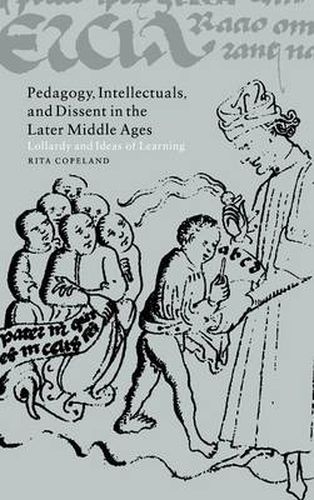Readings Newsletter
Become a Readings Member to make your shopping experience even easier.
Sign in or sign up for free!
You’re not far away from qualifying for FREE standard shipping within Australia
You’ve qualified for FREE standard shipping within Australia
The cart is loading…






This book is about the place of pedagogy and the role of intellectuals in medieval dissent. Focusing on the medieval English heresy known as Lollardy, Rita Copeland places heretical and orthodox attitudes to learning in a long historical perspective that reaches back to antiquity. She shows how educational ideologies of ancient lineage left their imprint on the most sharply politicised categories of late medieval culture, and how radical teachers transformed inherited ideas about classrooms and pedagogy as they brought their teaching to adult learners. The pedagogical imperatives of Lollard dissent were also embodied in the work of certain public figures, intellectuals whose dissident careers transformed the social category of the medieval intellectual. Looking closely at the prison narratives of two Lollard preachers, Copeland shows how their writings could serve as examples for their fellow dissidents and forge a new rapport between academic and non-academic communities.
$9.00 standard shipping within Australia
FREE standard shipping within Australia for orders over $100.00
Express & International shipping calculated at checkout
This book is about the place of pedagogy and the role of intellectuals in medieval dissent. Focusing on the medieval English heresy known as Lollardy, Rita Copeland places heretical and orthodox attitudes to learning in a long historical perspective that reaches back to antiquity. She shows how educational ideologies of ancient lineage left their imprint on the most sharply politicised categories of late medieval culture, and how radical teachers transformed inherited ideas about classrooms and pedagogy as they brought their teaching to adult learners. The pedagogical imperatives of Lollard dissent were also embodied in the work of certain public figures, intellectuals whose dissident careers transformed the social category of the medieval intellectual. Looking closely at the prison narratives of two Lollard preachers, Copeland shows how their writings could serve as examples for their fellow dissidents and forge a new rapport between academic and non-academic communities.